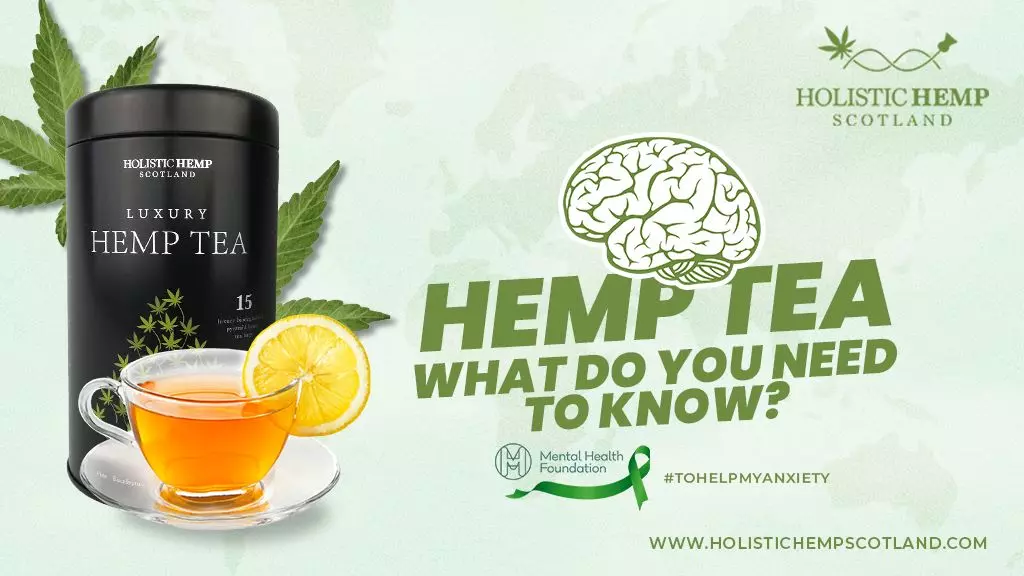Recent Posts
Post Catagories

Hemp tea is well known for having possible relaxing effects on the heart and mind.
Many people who consume hemp-based meals or utilise hemp-based products also like a nice cup of Hemp tea.
Given that hemp is derived from the same plant as cannabis (sometimes known as “marijuana”), many people are still confused if it is safe or even legal to consume the tea.
This article examines Hemp tea, its applications, advantages, and potential downsides. It also addresses the issue of whether or not psychoactive (high-inducing) substances should be a worry.
What Exactly Is Hemp Tea?
The Cannabis sativa plant, from which hemp is produced, is used to make a variety of food and personal care goods.
You might have already consumed hemp seeds or used hemp-based soap. The plant can also be used to make hemp tea, which is well-known for its relaxing effects.
Similar to making any other herbal tea, dry hemp is soaked in boiling water to make hemp tea. Aside from seeds and even little pieces of the root, you can utilise dried hemp leaves or flower buds. To create a tasty drink, filter out the solids.
The resulting tea has an earthy or slightly bitter flavour and is greenish-brown in colour.
Is THC Present In Hemp Tea?
The presence of tetrahydrocannabinol (THC) in hemp tea is one of the most commonly questioned topics.
The main psychoactive cannabinoid in the Cannabis plant—the source of both cannabis and hemp—is THC. After smoking or ingesting marijuana, THC causes people to feel high.
Cannabis and hemp are sometimes mistaken for one another, but they are not the same item.
A non-psychoactive cannabinoid present in hemp and cannabis called cannabidiol (CBD) is frequently used to lessen anxiety, treat pain, and enhance some heart health markers (1, 2, 3, 4).
THC is present in hemp in minute concentrations, but it is far more prevalent in cannabis. Hemp does not contain enough THC to have any psychoactive effects or to make you feel high. In instance, hemp can only have 0.3 percent THC or less (5, 6).
Because of this, hemp is farmed for leisure and herbal medicine uses, such as preparing tea or adding it to other foods and personal care items.
As long as it has trace levels of THC —.03 percent or less — hemp tea, and other products made from hemp, are legal to drink.
You have an extremely minimal risk of testing positive for drugs if you don’t regularly consume huge amounts of hemp.
Hemp Tea’s Application And Potential Benefits
Hemp tea is mostly used to promote relaxation of the body and mind. Non-psychoactive CBD and other bioactive substances are present, which contributes significantly to its capacity to produce relaxation.
However, bear in mind that hemp tea is most likely to contain significantly less CBD than the concentrations used to evaluate the effects of CBD. The consumption of hemp tea by itself might not have a substantial impact.
The potential benefits of hemp tea include the following, according to research
- This type of tea is caffeine-free, in contrast to several other forms of tea. This means that unlike a caffeinated beverage, it won’t give you the jitters or keep you up at night.
- Some teas, such as green tea, have energising qualities that are further supported by the amino acid L-theanine. The digestion of caffeine is slowed by this amino acid. As a result, green tea provides a more consistent and long-lasting energy boost than a cup of coffee. Without the jittery side effects or the crash once the caffeine wears off, you’ll experience an improvement in focus and energy. Additionally, L-theanine raises alpha waves in the brain, which aids in improving focus while also having calming and relaxing benefits.
- Antioxidants in tea protect healthy cells from oxidative stress, which can harm them. Tea contains antioxidants that neutralise free radicals produced by pollution and other external causes that might lead to oxidative stress. Dementia and depression have been linked to oxidative stress. Additionally, antioxidants aid in the removal of pollutants from the body that may harm mental health. There is evidence that regular tea drinkers have reduced levels of stress and better overall health.
- Tea aids in digestion and can be used to treat a variety of conditions, including nausea, upset stomach, and diarrhoea. Tannins, which are also included in tea, have been demonstrated to lessen intestinal inflammation. This can be used to treat irritable bowel syndrome and ease stomach pains.
Hemp Tea’s Potential Drawbacks And Side Effects
It’s important to start gently and gradually if you’ve never eaten hemp because different people can react differently to new meals.
The danger of major negative effects is low while using hemp and CBD products. However, other studies have shown that CBD users may have unintended changes in appetite, diarrhoea, or fatigue.
Hemp tea should not be consumed if you are on any drugs because it can interact with them.
Digoxin and other heart failure drugs can be used to reduce overall heart rate while strengthening individual heartbeats. For those who are taking these medications, hemp may make their heart rate slow even more.
Additionally, if you take diuretics, which can also cause potassium losses, you should avoid hemp because it may drop potassium levels. Diuretics like furosemide and others help the body retain less water.
Medications like the epilepsy drug clobazam that are used to control seizures and electrical activity in the brain, as well as CBD, may interact with one another.
Additionally, there may be interactions between CBD and several antidepressants and analgesics.
Always get medical advice before including hemp tea or other CBD sources in your diet or wellness programme. They can help you discover potential interaction hazards and inform you of any further reasons you should steer clear of these products.
In Conclusion
Similar to how other herbal teas are created, hemp tea is a beverage made by steeping dried hemp leaves or flower buds in boiling water. Hemp tea is naturally devoid of caffeine and rich in CBD and other non-psychoactive cannabinoids.
Hemp is only allowed to have trace levels of THC, therefore when used moderately, it won’t make you high and won’t likely result in a positive drug test.
Although many individuals prefer to brew their own hemp tea at home, they may also be bought from like Holistic Hemp Scotland.
Trace quantities of CBD, like those in hemp tea, can have measurable health impacts, more carefully controlled human study is needed to confirm this.
While hemp and CBD are usually thought to be harmless, there is a chance that they could interact with different drugs. Consult a medical expert before including hemp tea in your daily health regimen.

